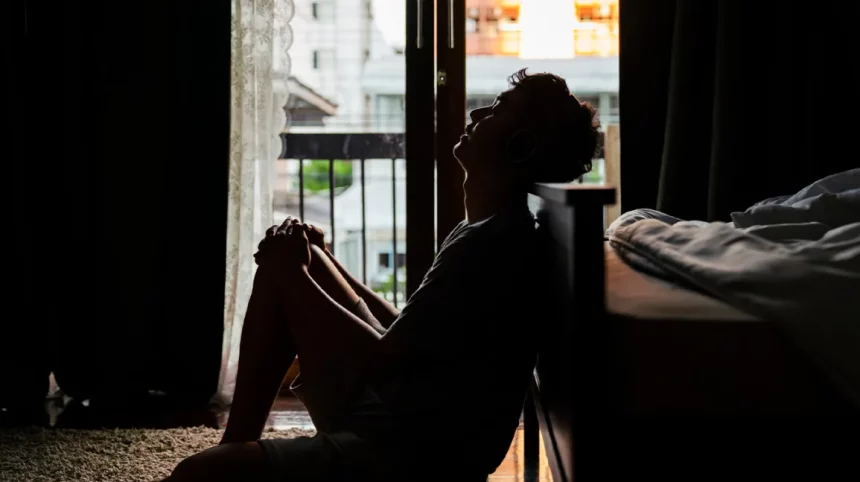Chances are if you don’t struggle with depression, you almost certainly know someone who does.
Nearly 18% of adults — more than 1 in 6 — said they are currently depressed or getting treatment for depression, according to a 2023 Poll. In 2015, when Gallup first started collecting information on the topic, the number was under 11%.
the data shows that clinical depression was slowly rising in the country before the pandemic, but it grew faster in its aftermath, with social isolation, loneliness, fear of infection, psychological exhaustion, substance abuse and disruption in mental health care all taking a toll. Rates among women, young adults, and Black and Hispanic adults are rising the fastest.
HOW TO GET HELP
- Help is available if you or someone you know is struggling with suicidal thoughts or mental health matters.
For adolescents, ages 12 to 17, the statistics are also dire: 5 million kids in that age group — just over 20% — experienced an episode of major depression in 2021 (the most recent year with available data), with 3.7 million experiencing severe impairment.
Psychiatrist Charles Raison, a professor of human ecology and psychiatry at the University of Wisconsin-Madison, said he has struggled with depression himself. Raison, who is also the director of the Vail Health Behavioral Health Innovation Center and a former mental health expert for Health, described the state of mental health in one word: “bad.”
“There is just no doubt that depression and anxiety and suicide and substance abuse have been on the rise in the United States … for probably 20, 25 years, maybe longer,” Raison told CNN Chief Medical Correspondent Dr. Sanjay Gupta recently on the podcast Chasing Life. “But they’ve really been on the rise over the last 10 years, and the data are really consistent.
“The rise is not equal amongst all age groups,” Raison said. “The people that are really suffering are young people. So, people between the ages of like 15 and 35, that’s where you see this really, really disturbing increase.”
While the rise of depression among Americans is alarming, what’s also unsettling is the difficulty in pinpointing the cause. We can’t see it on a brain scan. We don’t have a blood test for it. We can’t measure its severity accurately.
Raison compared depression to “dropsy” — an old-fashioned term for edema — which could be caused by different underlying conditions or factors. “It could be … heart failure. It could be pneumonia. It could be cancer. There (are) different reasons to produce those symptoms,” he said.
“Will we ever find a test for diagnosing depression? No, because depression is like dropsy …,” he said, pointing to possible different underlying causes. “Depression is not a single thing that’s going to yield itself to a single test.”
And that may be one reason why depression is so challenging to treat.
Take antidepressants such as Prozac, also known by the generic name fluoxetine. It was launched in the country 35 years ago as the first in a new class of drugs called selective serotonin reuptake inhibitors, or SSRIs. The idea was depression resulted from a chemical imbalance in the brain, and the imbalance could be corrected by targeting the neurotransmitter serotonin. Serotonin–norepinephrine reuptake inhibitors, or SNRIs, which target two neurotransmitters, followed in 1993.
But antidepressants don’t work for everyone.
“The question of the use of antidepressants, which are the first-line treatment for depression in the United States, is incredibly complex,” Raison said, noting that they are “lifesavers for some folks.”
“But as we’ve gone along in the last 20 years, we’ve had to metabolize, as a field, a number of very hard truths about antidepressants and their effectiveness,” he said. “One hard truth, and the most obvious one, is that they don’t work nearly as well as we thought they did 30 years ago,” estimating that only 30% of patients “get a full response.”
To hear what promising new treatments are being tried for depression, listen to the full episode of Chasing Life here:
Commit to getting help
Make an appointment with a mental health professional.
“If you’re feeling unremittingly down, if you’ve lost interest in life, if your sleep and your appetite are altered, if you feel hopeless, if you are having thoughts of hurting yourself, these sorts of things — that’s what depression is,” Raison said. Getting help is especially important if you’ve experienced those symptoms for a couple of months.
“All of us who struggle with depression know that having a clinician … can help you — either with psychotherapy or medications … or both,” he said.
Lifestyle interventions can help
It turns out that what is good for the body is also good for the brain.Is exercise or medication better for depression? Experts weigh in
“Really try to do the sort of things that you would do for your physical health,” Raison said. “I often tell people, ‘Think about what you’d do if you wanted to deal with your heart health and do the same thing.’ All those things are also antidepressants. So managing body weight, eating healthy foods, getting enough sleep, getting enough exercise, getting sunlight.”
Be around people
Try to maintain close relationships.
“(Tip) No. 3 is sometimes very hard when you’re depressed. … But it is probably the single most important thing, which is trying to maximize our interpersonal connections with other people,” Raison said.
“If you have caring, smaller, supportive relationships with other people, it’s a big protective factor against getting depressed. It’s also a factor that can really help you get over depression.”
Don’t give up
Be persistent in seeking help.
“The way people, especially in United States, respond to antidepressant medications tends to be very bifurcated,” Raison said. “There’s a smaller group of people that just start an antidepressant, and they feel better within a couple of weeks and … and the depression goes away,” while others struggle with chronic depression.
So, if one antidepressant doesn’t work, he said, “Try another.”
But don’t be afraid to move on. “We’ve known for a long time, for instance, that people who don’t respond to a bunch of antidepressants in a row are less likely to respond to the next one, but they’re not less likely to respond to psychotherapy,” he said.
Embrace appreciation
Generate a state of thankfulness.
“Work on developing an attitude of gratitude,” Raison said.
Raison admits doing so is not always easy when you’re depressed. “If you can make it a habit, it can be very powerful both to prevent depression, but also to feel better if you are depressed,” he said.
We hope these five tips help you better care for a depressed brain. Listen to the full episode here. And join us next week on the Chasing Life podcast when we explore dating and the brain, and what all that swiping does to us.



